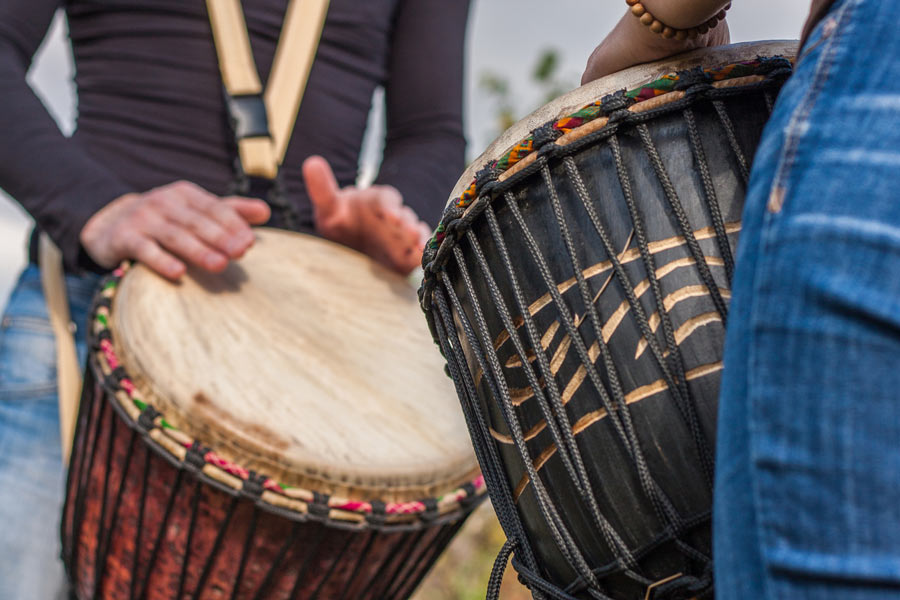The views expressed in our content reflect individual perspectives and do not represent the authoritative views of the Baha'i Faith.
Hopefully, after the first three essays in this series, you may have begun to discover the essence of why I am so attached to the Baha’i message and its teachings about music.
Musicians, if we’re true to our craft in the mystical art of creating music—as all musicians try to be—we each turn to inspiration from our Creator. All the indigenous peoples of the world readily understand and recognize the Creator as the source of everything, including humanity. They know, immediately, who, or what you are taking about when you use the word Creator, in their language. The Creator is a known entity, by all.
So here’s a suggestion—all musicians should take at least one class in the study of Ethnomusicology. That science—the study of music from the cultural and sociological viewpoint of the people who make it—can tell us an enormous amount about the true origins of the world’s music. I think of ethnomusicology as the most Baha’i-like approach to the study of music and, as a result, if offers us the understanding that truly represents the phrase Baha’is constantly use: Unity in Diversity.
All of the indigenous music of the world speaks to each culture and explains what it means to be them.

I started every one of my classes—The Survey of World Music, which I taught at Oakland University—by writing this axiom on the blackboard: “Music is a means by which mankind expresses the essence, of his own existence.”
I asked each student to write that statement down at the top of their first page of course notes. “Keep it,” I told them, “and six weeks or so into this course of music exploration, you might begin to really understand what it actually means.”
Sadly, the musical decline and degradation taking place around the world is by no means exclusive to any single country. However, I am ashamed to say that the biggest export from the USA, now being adopted by many of the cultures around the world, is that decline and degradation of the quality of music, which alters and crowds out the marvelous expressiveness of the old indigenous traditions everywhere.
No, this is not just my evaluation of what is taking place—but is confirmed and deplored by the old Masters of all those great expressions threatened by the crassness of the current trends. The lifelong commitment and craft required by the students of the old traditions are being ignored, and short cuts are being used, rampantly. Rather than learning the complete mastery of those great traditions which demanded that commitment, the beauty and expressiveness of the old traditional forms are being replaced by a focus on technique, automation and uniformity of sound. We who have friendships and relationships with those classical musicians around the world, know that they frequently share the tragedy of the loss of the warmth and beauty of their old traditions.
It is not the newness of the current expressions we mourn—it is the loss of the beauty and the expressiveness of the soul. Instead, we now hear automated, machine-made “music” that expresses an emphasis on technical mastery, which to me truly represents the catastrophic breakdown in human relations we can clearly see in the degradation of the arts. Musicians and listeners both, now is the time to further demonstrate the truth of what has been going on, a truth so insidious that we don’t even realize that we are accommodating to it.
Please, let us not throw these beautiful indigenous musical expressions away. Their loss would create nothing but despair. Once they’re lost—which can happen in a generation or less—how then can they help us bring about the rich and diverse world we all want?
Instead, we need to widen our scope and broaden our perspective. Rather than sticking with one popular musical genre, try to practice playing or listening to something new, something that challenges you, songs and musical forms you haven’t heard before. Teach your children and your grandchildren the music of the world, and encourage them to learn it:
The art of music is divine and effective. It is the food of the soul and spirit. Through the power and charm of music the spirit of man is uplifted. It has wonderful sway and effect in the hearts of children, for their hearts are pure, and melodies have great influence in them. The latent talents with which the hearts of these children are endowed will find expression through the medium of music. Therefore, you must exert yourselves to make them proficient; teach them to sing with excellence and effect. It is incumbent upon each child to know something of music, for without knowledge of this art the melodies of instrument and voice cannot be rightly enjoyed. Likewise, it is necessary that the schools teach it in order that the souls and hearts of the pupils may become vivified and exhilarated and their lives be brightened with enjoyment. – Abdu’l-Baha, The Promulgation of Universal Peace, p. 52.
If you do this, I guarantee you’ll find new modes of expression and discover new and diverse ways of hearing the musical heritage of our entire planet.
















Comments
Sign in or create an account
Continue with Googleor